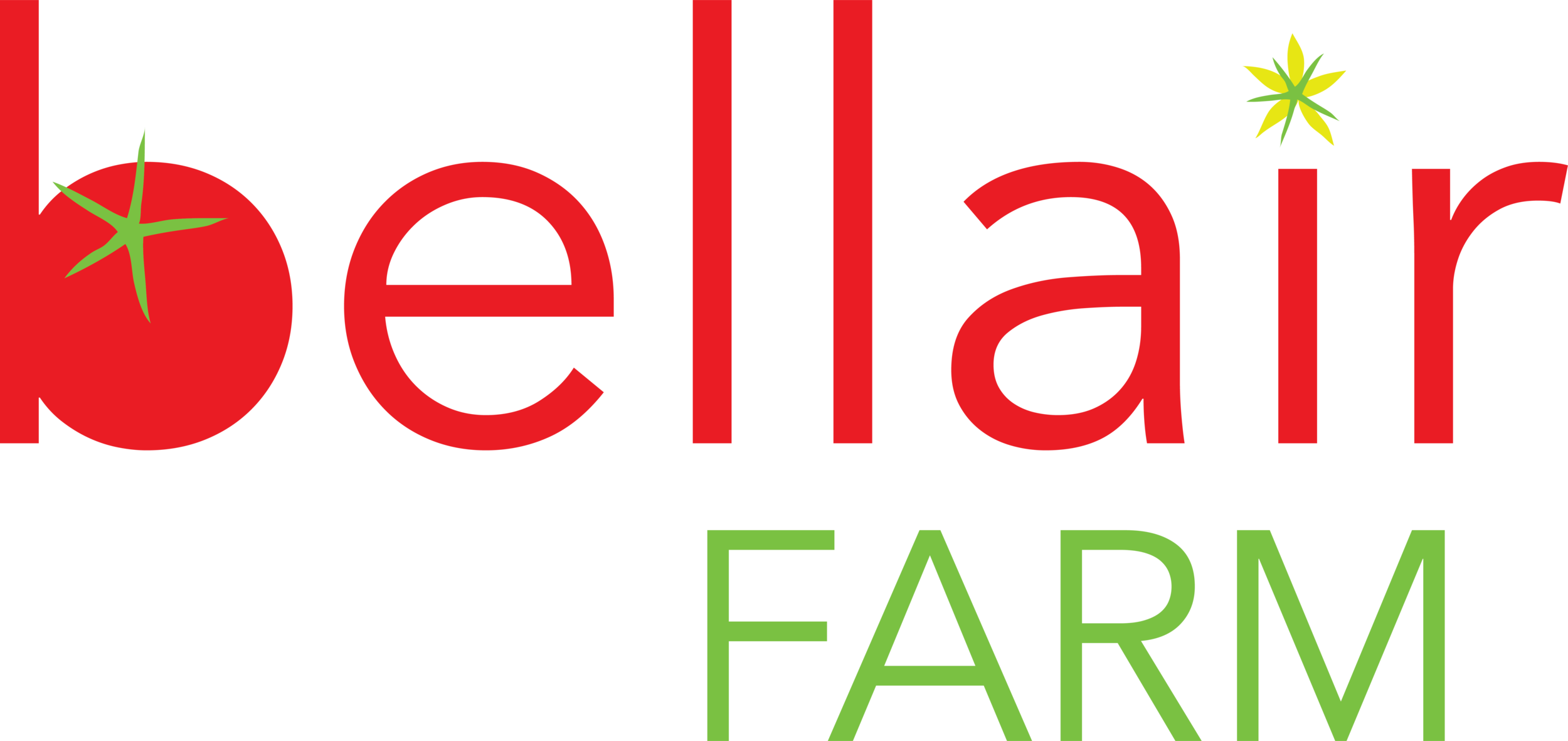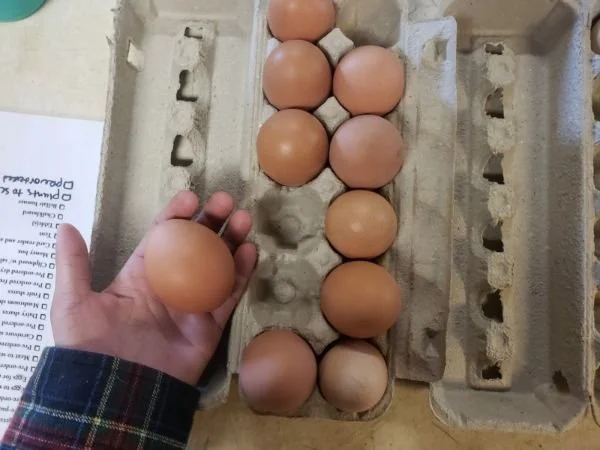All About Eggs
The ‘new’ chicken coops we got a couple years ago. The hens like them more, and we do, too.
Egg Production on Bellair Farm
We've always had a flock of layers on the farm. I remember on my interview day back in 2011, Jamie took me out to the coop to collect eggs and it was my first time seeing the net electric fence. I think back then we had about 70 layers or so. Fast forward to 2023, and Nat and I purchased 800 layers for this season. We had been gradually increasing our laying flock over the years and building more and more moveable chicken coops to house them. A couple years ago, the farmers at Free Union Grass Farm decided to get out of the egg business and sell their two deluxe laying hen coops to us. What a revolution! The new coop design, though not apparent to the average person, is a VAST improvement over what we had been using. It allows more chickens to fit in comfortably and -- it's hard to explain why -- they just "like" them more for a lot of reasons (lower floors, plenty of perches and places to escape the crowd).
One of the biggest challenges we have faced with egg production is predation (loss by predators). As they say, everything loves chicken. We think about predators in 2 categories. First, you have your ground predators: most likely it's a possum, skunk, or raccoon. If you see a ton dead in one night, it could be fox or weasel, but that's much less common. Coyotes, which people often bring up, would never go for chickens behind net fence. Then, you have your aerial predators: hawks, eagles, and owls. For both sets of predators, moving the chickens frequently an keeping their electric fence “hot” was a “good enough” defense for a while. Over time, we experienced more and more losses as the predators of all kinds learned year after year. We put up hawk lines, got guard geese and put double chargers on the fences. Closing coop doors at night was something that felt beyond our capacity after already working such long days, and waiting at dusk with a gun felt similar. Finally, after 2022, we had sufficient losses as to be effectively out of eggs for over 8 months. We knew it was time to get out of the egg business or find another solution. We ended up deciding on guard dogs, and now, a couple months in, we can say they are pretty effective! Of course, they have their own chores and challenges, but they are the only thing that can keep our flock in relative safety.
Egg production is tricky. It waxes in spring and fall and wanes in winter and summer as the birds respond to the physical demands on their bodies as the seasons change. Similarly to production, the egg market is also variable! There is greatest demand for eggs during the farmer's market season from April-October. We have also been successful in establishing a pretty strong winter customer base for ourselves (thank you if your'e one of them!). Because of how the production and market overlap, there's always an overstock in spring but then a shortage in summer. Eggs last a long time (see below), but there is a limit and so we will occasionally have an egg sale just to move excess eggs until we are at a reasonable buffer.
Here's a view of an egg bucket just after collection. You can see dirt and poop on these, which we clean off by hand. In addition to the brown eggs, this bucket (photo from years ago) has 2 goose eggs and a couple blue-green Americauna eggs.
Frequently-asked Egg Questions
Here's a helpful guide we made to help new crew distinguish between pullet eggs and regular!
Why type of laying hen does Bellair Farm have?
We have "Golden Comet" chickens, which are a cross between Rhode Island Red and White Leghorn chickens. The former is the backyard standard and the latter the industry standard. The Golden Comet is the perfect mix of foraging/smarts of the RIR with the docile and heavy laying of the WL.
How often do you collect eggs and how many do you get?
We collect our hens' eggs daily and get over 50 dozen per day in peak season. A chicken lays an average of an egg a day during peak production and less than that in off-peak.
What is a pullet egg?
A pullet is a young chicken who hasn't started or has just started to lay eggs. A pullet egg is an egg laid by a pullet and it is noticeably smaller than a chicken egg.
What determines egg color and is there a difference?
The breed of chicken determines the color of the egg. There's no taste or nutritional difference based on egg color alone. Differences like that have to do with diet and lifestyle for the hens.
Does Bellair move their chickens?
Yes! We do "little moves" where we pull the coops forward in the same fence area at least once a week and larger moves where we move the whole fence for another bout of mini moves. The chickens stay close to the coop, so when you move the coop, you move the chickens!
Will the chickens be by the barn this year?
We keep our laying flock under a pole barn for winter but we move them down into our production fields for the summer. We utilize the manure to improve our fields, and of course, we keep tight track of application dates for food safety reasons.
Do you ever sell your hens?
Yes, occasionally. The time of year to look out for that is winter, usually November-January.
What food do your chickens eat?
They eat a non-GMO feed that we get from Sunrise Farms in Stuart's Draft, VA. The feed is a mix of corn, soy, other grains, and a ton of essential minerals. We also provide our chickens with 3 other essential items: oyster shell for calcium, grit for digestions, and fresh pasture to supplement their diet. Sometimes folks ask about grass-fed chicken or grain-free chicken and that's not really a thing. You might be able to raise a chicken without feeding it grain in a backyard setting, but we could never keep our flock healthy that way. They need their grains! And, lest we forget, grass seed is essentially a "grain" as well.
Do you wash your eggs?
Yes, we do, by hand. We use a special soap designed for the job.
Do you have to refrigerate eggs?
Once they are washed, yes, technically. The washing removes a protective membrane. So why do we wash? because poop is gross, that's why! For just a few birds, you can get away with not washing, but nobody wants a poopy egg.
How long do eggs last?
If they are stored properly in refrigeration, they will last for 4 months or even longer! We always sell our eggs within a few weeks of collection, so it is pretty much impossible for your eggs to go bad before you're eaten them. That being said, if an egg is bad, it's BAD, and you know about it! This is usually caused by micro-fractures in the shell that weren't apparent to us. If you ever get bad eggs (especially if you get a couple or if you're sure the egg wasn't cracked), we wanna know right away!
Can we re-use the cartons?
Not to put new eggs in, according to VDACS regulations. We'll take the cartons back to use for crew eggs and to start woodstove fires with, if you want to give them to us for that purpose.
Some eggs are just too big! When the carton can't close on them, we set these aside and a crew member will usually take them. Gotta feel bad for the chicken!




